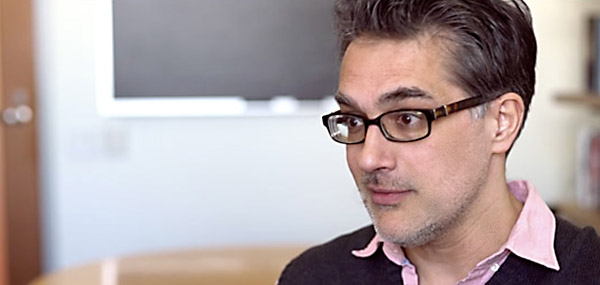MIT SCHOOL OF HUMANITIES, ARTS, AND SOCIAL SCIENCES
Media + Awards Digest | May 2019

RECENT STORIES IN THE MEDIA
NOTRE DAME DE PARIS
MUSIC AND THEATER ARTS
Notre Dame can be rebuilt, but its unique sound may be gone forever | Michael Cuthbert
We still lack the technologies to re-create the sound of historic spaces that have been transformed, or destroyed. But recent advances in recording, signal processing and artificial intelligence are bringing us closer.
Op-ed at the LA Times | Michael Cuthbert
GLOBAL STUDIES AND LANGUAGES
The 'vast symphony in stone,' weaves its way through Parisian history | Catherine Clark
Seeing Notre Dame and its rooftop gargoyles overlooking so many visual representations of Paris over the years, "you get the sense of the cathedral as a solid and immovable place, watching history unfold beneath it," said Catherine Clark, an associate professor of French studies at MIT.
Story at NPR | Catherine Clark

Interior, Notre Dame de Paris, iStock
Why the Notre Dame fire is so devastating | Catherine Clark
"Notre Dame is unique in the fact that it's so old and still so relevant," says Catherine Clark, a scholar of Paris and professor of French studies at the Massachusetts Institute of Technology. "It matters in terms of its enduring solidness."
Story at U.S. News
How The Hunchback Of Notre Dame helped France rediscover its love for the cathedral
While the world begins thinking about rebuilding Notre Dame, we remember how Victor Hugo helped people fall in love with the cathedral through his 1831 novel The Hunchback of Notre Dame. Here & Now's Robin Young talks with MIT cultural historian Catherine Clark.
Conversation at WBUR
AI | ETHICS AND SOCIAL IMPLICATIONS
ETHICS, COMPUTING, AND AI
Series: Ethics, Computing, and AI | Perspectives from MIT
Will the future be humane, just, and livable? Twenty MIT faculty offer practical, inspiring, and clear-eyed views in this series.
Browse the Series | Online Booklet: Series Highlights
TEACHING AND LEARNING
There’s no such thing as a “tech person” in the age of AI
We need to stop perpetuating the false dichotomy between technology and the humanities. To do otherwise would be detrimental to society.
Story at Technology Review
COMPARATIVE MEDIA STUDIES
Ethics alone can't fix big tech | Links to work by Sasha Costanza-Chock
Ethics can provide blueprints for good tech, but it can’t implement them. Costanza-Chock writes: "Design justice focuses on the ways that design reproduces, is reproduced by, and/or challenges the matrix of domination.
Story in Slate | Sasha Costanza-Chock
PHILOSOPHY | ROADS NOT TAKEN
Facing your mid-career crisis | Kieran Setiya
"When we look back at our lives, we conjure — sometimes with relief but other times with regret — the roads not taken. Can philosophy help us come to terms with this? I think it can. It does so by reframing the predicament of regret."
Commentary in Harvard Business Review | Kieran Setiya
Podcast: How to Cope with a Mid-Career Crisis Listen
Video: Behind the Story Watch
MUSIC AND COMPUTATION
MUSIC AND COMPUTATION
Michael Scott Cuthbert's "music21" featured on Podcast.__init__
The "music21" software toolkit for Computational Music Analysis, created by Associate Professor Michael Scott Cuthbert and his lab at MIT, was featured on the Podcast.__init__ as "an increase of many orders of magnitude in the scope and scale of musical analysis that we can perform."
Listen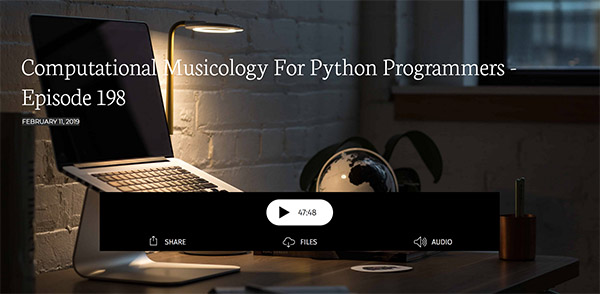
MEDIA + SCIENCE, TECHNOLOGY, AND SOCIETY
COMPARATIVE MEDIA STUDIES
1968, media, and the Chicago Democratic Convention | Heather Hendershot
Media studies scholar Heather Hendershot discusses Walter Cronkite, Mayor Daley, and coverage of the Chicago Democratic Convention. Hendershot says, it’s important to revisit and reinterpret what happened in part because many Americans have sharply divergent understandings about the events.
Commentary at the Nieman Reports | Heather Hendershot
HISTORY / ANTHROPOLOGY/ SCIENCE, TECHNOLOGY, AND SOCIETY (HASTS)
Clare Kim on recovering connections between math and the humanites
Via "With a Side of Knowledge" podcast from Notre Dame: "We go to brunch with MIT SHASS doctoral candidate Clare Kim and talk about a surprising history of dialogue between mathematics and more humanistic pursuits. Here's Clare on why that's important."
Podcast: Listen at Notre Dame's website | Clare Kim
KNIGHT SCIENCE JOURNALISM PROGRAM
How we endured the McCarthy purges in US | Ehsan Masood
Seven decades later, many Americans may only be aware of the blacklisted Hollywood 10. But other survivors, such as university academics from the 1950s generation, also have stories to share of political intimidation.
Commentary at BBC News Online
COMPARATIVE MEDIA STUDIES
Twitter and Gamergate | Trice, Potts
Last year, MIT media researchers Michael Trice and Liza Potts wrote about the "dark patterns" of Twitter that Gamergate found and made use of, turning "the Twitter experience into an inescapable Gamergate experience."
Story at Vox
ECONOMICS
ON JUMP-STARTING AMERICA
A new book from MIT economicsts Jon Gruber and Simon Johnson
Gruber and Johnson argue for significant research and development spending
MIT economists Jon Gruber and Simon Johnson talk about their new book Jump-Starting America, which argues for significant research and development spending outside already thriving areas to remedy the hollowed out nature of the U.S. economy. Johnson says: “We think it's very easy to spread prosperity through investing more in science and technology."
Story at Politico
'Jump-Starting America' | As an Invitation to a Conversation with Economic Conservatives
"What I want to hear are your reasons why you think that Gruber and Johnson — two MIT economists — are getting things wrong. Before we go over the main arguments for the book, and before I try to convince everyone that this book is worth the investment in time to read, let's get clear about the types of conservatives I'd like to engage."
Inside Higher Ed
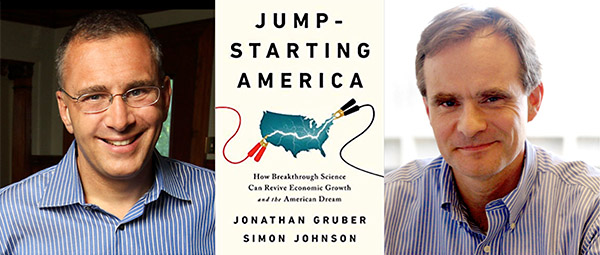
L: Jon Gruber; photo by Bill Greene/The Boston Globe; R: Simon Johnson, photo via MIT News
One of the most important lessons of the innovative post-1945 period in the US is that research and development drive productivity, better jobs, and higher incomes. And "government support for science," say Gruber and Johnson, "can create an economic tide that lifts all boats.”
Book review: Investing in the brain
In their book, Jump-Starting America, MIT professors Jonathan Gruber and Simon Johnson have “produced a superbly argued case for public and private investment in education and research.”
Review at the Wall Street Journal
How to make America grow again
“America desperately needs more hubs of growth, where talent and money can converge to create new industries,” write professors Jonathan Gruber and Simon Johnson. “It’s a problem that the government can and should address, by identifying and investing in the technologies of the future — and ensuring that the American people as a whole share in the gains.”
Full story via Bloomberg News
Coastal tech hubs reign, but smaller U.S. cities offer an edge
MIT economists Simon Johnson and Jonathan Gruber identified 102 potential places which could develop into tech hubs if they received significant public investment. Topping their list of potential hubs are Pittsburgh, Columbus, Ohio, and Rochester and Syracuse in New York.
Story at Bloomberg
ECONOMICS, CONT.
Trump's China tariffs hit America's poor | Ivan Werning, Arnaud Costinot
A pair of economists from Massachusetts Institute of Technology recently checked to see if Lerner's theory works in practice. “As we show,” they wrote in a joint email to me last week, “it remains true under far wider situations than it was originally thought."
Story at Bloomberg Businessweek
On Medicare-for-all | Jonathan Gruber
MIT Ford economics professor and ObamaCare and RomeyCare architect, Jonathan Gruber, talks tech jobs, Bernie Sanders’ Medicare-for-all push, Alexandria Ocasio-Cortez’s Green New Deal, and Elizabeth Warren’s tax proposal.
Conversation at Fox
ON ECONOMIST DAVID AUTOR'S RESEARCH
The 46 newest jobs identified by the US government
MIT's David Autor and Anna Salomons of University of Utrecht use data to try to understand the nature of jobs coming in the future. They find that most new job categories are a result of new technologies and increases in wealth that allow for niche jobs serving people with lots of disposable income.
Story at Quartz
A simple way to reduce suicides: Increase the minimum wage
In a paper to be published in American Economic Review: David Autor of MIT, David Dorn of the University of Zurich, and Gordon Hanson of the University of California at San Diego drew on data from 1990—2014 to find that the death rate among men tended to rise in cities where jobs were vanishing because of competition from cheap foreign goods.
Story at Washington Post

Are robots really coming for your job?
Today's workforce is sharply divided by levels of education, and those who have not gone beyond high school are affected the most by long-term changes in the economy, says David Autor, an MIT professor of economics. “It's a great time to be young and educated. But, Autor says, there's no clear land of opportunity” for adults who haven't been to college.
Story at Fast Company
The corporate world has its own inequality problem
It's easy to draw a line from company inequality to individual inequality: Superstar companies pay their own people well, but they are highly productive so they don't have a lot of employees per dollar of sales or profit. Workers lose, while capitalists win, concludes David Autor of MIT and four other authors.
Story at Bloomberg Businessweek
POLITICAL SCIENCE
SECURITY STUDIES
Iran sill stop complying with some parts of U.S. nuclear deal | Jim Walsh
Iran's president, Hassan Rouhani, said Wednesday that Tehran will stop complying with some commitments it made in the Iranian nuclear deal. Robin Young speaks with Here & Now security analyst Jim Walsh, with MIT's Security Studies Program.
Commentary at WBUR | Jim Walsh
GOP opposing Democrats' efforts to tighten vaccine laws | Adam Berinsky
Officials are worried they are “three Trump tweets away” from the issue becoming even more polarized, according to MIT political scientist Adam Berinsky.
Story at Salon | Adam Berinsky
The difference between socialism and social democracy | Daron Acemoglu
Daron Acemoglu, a professor of economics at MIT, who has thought deeply about global and domestic inequality, draws a clear distinction between socialism and social democracy. In Acemoglu's view, Sanders' “economists don't understand basic economics. They are not just dangerous, they are clueless.”
Story at New York Times | Daron Acemoglu
Is apocalyptic rhetoric dangerous for Democratic candidates? | Vipin Narang
Vipin Narang, a professor of political science and a nuclear proliferation expert at MIT, says that in contrast with Gabbard's statements, the US and the world faced a much greater threat of nuclear catastrophe during the cold war.
Story at The Guardian | Vipin Narang
ELECTION DATA LAB
America's election security | Charles Stewart III
Is America's voting system susceptible to hacking? MIT professor of political science and election expert Charles Stewart III shared his thoughts and research. Segments starts at 1:44.
Conversation at WGBH | Charles Stewart III
SECURITY STUDIES | NORTH KOREA
ON VIPIN NARANG'S RESEARCH / COMMENTARY
Kim Jong Un's weapon test may have included ballistic missile
“Kim Jong Un may be starting his ‘push-the-line' strategy, gradually seeing how much Trump will turn a blind eye to,” said Vipin Narang, an associate professor of political science at the Massachusetts Institute of Technology and a member of its security studies program. “Not good.”
Story at Bloomberg | Vipin Narang
U.S. risks emboldening Kim with muted response to missile test
“Even if we internally concur with Kim that the testing moratorium only applies to ICBMs, we shouldn't publicly say it, because it essentially says we will tolerate him testing anything short of that,” said Vipin Narang, an associate professor of political science at MIT and a member of its security studies program.
Story at Bloomberg News
North Korea throws down fresh challenges
North Korea says it has tested a new tactical guided weapon. It has also said it no longer wishes to negotiate with Mike Pompeo, the Secretary of State. Meanwhile, Moscow says Vladimir Putin will meet for a summit with North Korean leader, Kim Jong-un, later this month. Vipin Narang assess these developments.
Conversation at PRI's The World
North Korea tested a missile over the weekend. The Trump admin flubbed the response.
One could almost hear the collective sighs of relief in Washington, Seoul, Tokyo, Beijing, and other major capitals. The tweet “suggests he is willing to look the other way for now,” says Vipin Narang, an expert on North Korea's nuclear program at MIT. But he also noted that Trump's “anything is possible” statement was ominous.
Story at Vox
North Korea tests 'tactical' weapon, report says
Vipin Narang, an associate professor of political science at MIT who studies nuclear proliferation, said the weapon likely differs from the long-range missiles the North Korean regime has tested in the past few years.
Story at CNN
HONORS & AWARDS
ECONOMICS
David Autor awarded Carnegie fellowship
The MIT economist will study U.S. demographics and the urban-rural split in contemporary society.
Story at MIT News | Profile at The Economist
PHILOSOPHY
Augstín Rayo honored as an outstanding mentor for students
Rayo is a Professor of Philosophy and the Associate Dean for the School of Humanities, Arts, and Social Sciences.
Story at MIT News
ANTHROPOLOGY
Susan Silbey receives the Killian Award, MIT's highest faculty honor
The award citation states that “Professor Silbey is a world-renowned sociologist of law, celebrated for her groundbreaking work on legal consciousness and regulatory governance, most recently in scientific contexts," and that “in order to understand how the rules of law operate, we need to see how they are interpreted, defended, negotiated, and resisted by people as they do their jobs and go about their daily lives.”
Story | Susan Silbey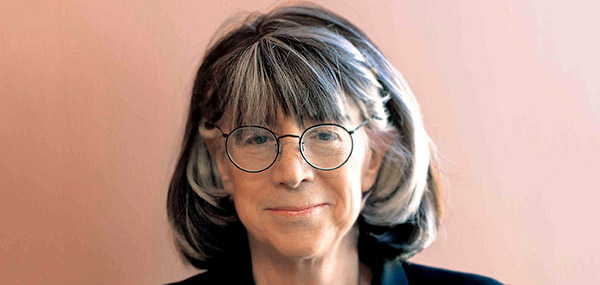
Susan Silbey, Leon and Anne Goldberg Professor of Humanities, Sociology, and Anthropology in the School of Humanities, Arts, and Social Sciences; and, in the Sloan School, a professor of behavioral and policy sciences
PHILOSOPHY
Judith Jarvis Thomson elected to the American Philosophical Society
Election to the American Philosophical Society honors extraordinary accomplishments in all fields.
About the APS | Judith Jarvis Thomson
MUSIC AND THEATER ARTS
Emily Richmond Pollock receives Arthur C. Smith Award
The award is presented to a member of the MIT faculty for meaningful contributions and devotion to undergraduate student life and learning at MIT.
More | Emily Richmond Pollock
MUSIC AND THEATER ARTS
Mark Harvey honored with Roy Haynes Award
Presented by JazzBoston, the award recognizes "exceptional contributions to jazz and the jazz community." Harvey's citation invokes his contributions as "a minister, musician, band leader, educator, community builder, and musical warrior for social justice.”
Story | Mark Harvey
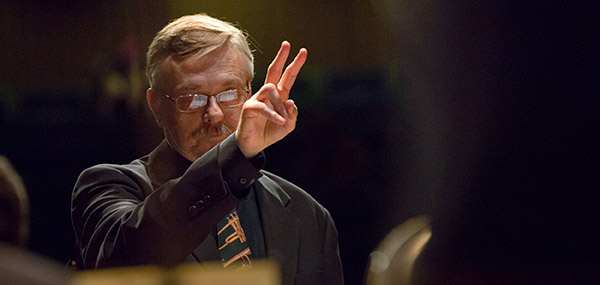
Mark Harvey, conducting the MIT Festival Jazz Ensemble; photo by Jon Sachs / MIT SHASS Communications
GLOBAL STUDIES AND LANGUAGES
Isabelle de Courtivron Writing Prize announces 2019 winners
The Isabelle de Courtivron writing prize is awarded annually to recognize high-quality undergraduate writing on topics related to immigrant, diaspora, bicultural, bilingual, and/or mixed-race experiences. This year five undergraduates were honored, with first place going to Ivy Li '20.
Meet the winners
ECONOMICS
John Van Reenen receives the NIHCMF 25th annual Research Award
Van Reenen's research collaboration on hospital prices and competition found that hospital prices increased significantly when merging hospitals were geographically close. Judges were impressed with the national reach of the work and its impact in raising public policy questions regarding antitrust enforcement.
More | John Van Reenen
STUDENT ART PRIZES
Students and student groups win over $15,000 in competitive prizes
Teach to Learn is awarded first place in the 2019 Creative Arts Competition, while senior students take home numerous art prizes.
All winners

A section of Said and Done
Full May 2019 edition
STAY IN TOUCH
Follow us
![]()
![]()
Research Impact
Explore
SHASS on MIT News
Research, Features, Awards
MIT Campaign for a Better World
Story | Join Us
Videos
Watch
Published by SHASS Communications
Office of the Dean, MIT School of Humanities, Arts, and Social Sciences
Published 19 May 2019
